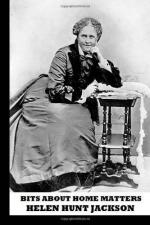It was with more than such misgiving that I first crossed the threshold of Mrs. ——’s house in Bedford Place, Bloomsbury. At this distance I smile to remember how welcome would have been any alternative rather than the remaining under her roof for a month; how persistently for several days I doubted and resisted the evidence of all my senses, and set myself at work to find the discomforts and shortcomings which I believed must belong to that mode of life. To confess the stupidity and obstinacy of my ignorance is small reparation, and would be little worth while, except for the hope that my account of the comfort and economy in living on the English lodging-house system may be a seed dropped in due season, which shall spring up sooner or later in the introduction of a similar system in America. The gain which it would be to great numbers of our men and women who must live on small incomes cannot be estimated. It seems hardly too much to say that in the course of one generation it might work in the average public health a change which would be shown in statistics, and rid us of the stigma of a “national disease” of dyspepsia. For the men and women whose sufferings and ill-health have made of our name a by-word among the nations are not, as many suppose, the rich men and women, tempted by their riches to over-indulgence of their stomachs, and paying in their dyspepsia simply the fair price of their folly; they are the moderately poor men and women, who are paying cruel penalty for not having been richer,—not having been rich enough to avoid the poisons which are cooked and served in American restaurants and in the poorer class of American homes.
Mrs. ——’s lodging-house was not, so far as I know, any better than the average lodging-houses of its grade. It was well situated, well furnished, well kept, and its scale of prices was moderate. For instance, the rent of a pleasant parlor and bedroom on the second floor was thirty-four shillings a week, including fire and gas,—$8.50, gold. Then there was a charge of two shillings a week for the use of the kitchen-fire, and three shillings a week for service; and these were the only charges in addition to the rent. Thus for $9.75 a week one had all the comforts that can be had in housekeeping, so far as room and service are concerned. There were four good servants,—cook, scullery maid, and two housemaids. Oh, the pleasant voices and gentle fashions of behavior of those housemaids! They were slow, it must be owned; but their results were admirable. In spite of London smoke and grime, Mrs. ——’s floors and windows were clean; the grates shone every morning like mirrors, and the glass and silver were bright. Each morning the smiling cook came up to take our orders for the meals of the day; each day the grocer and the baker and the butcher stopped at the door and left the sugar for the “first floor front,” the beef for the “drawing-room,” and so on. The smallest article which could be required




